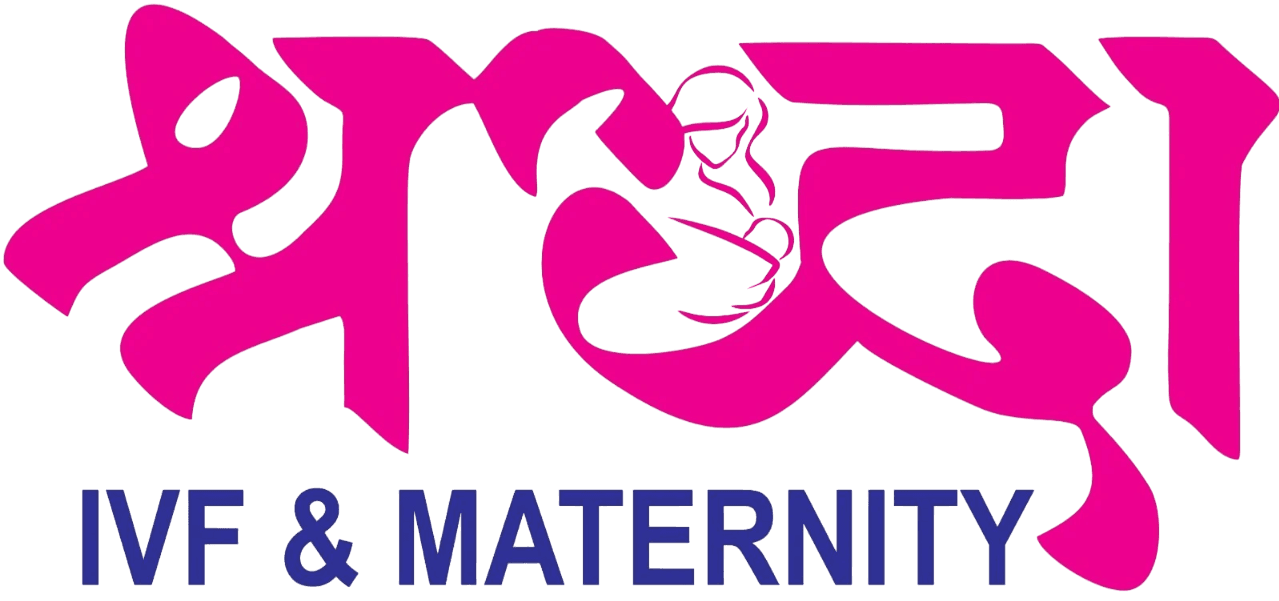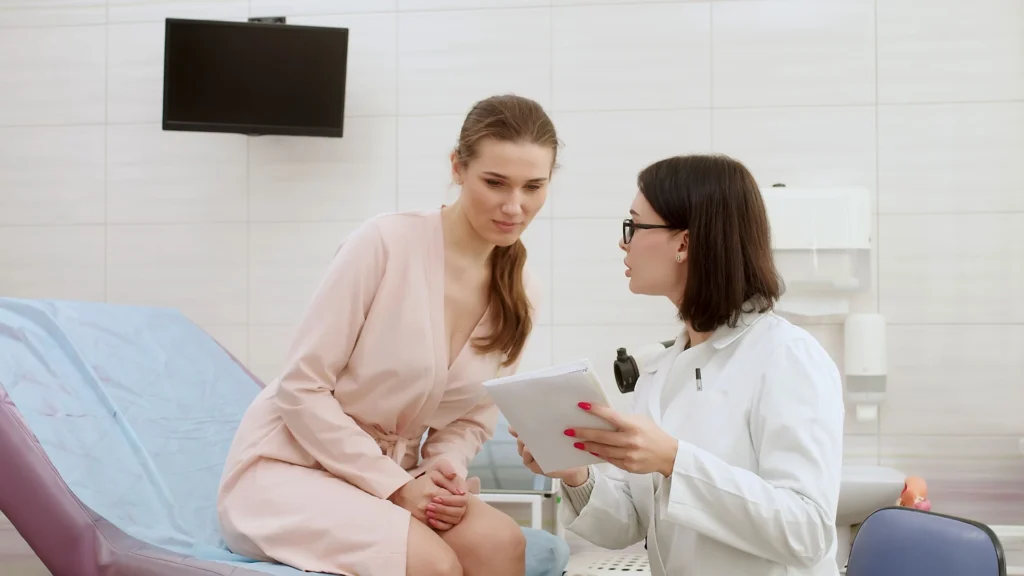For Blog in English scroll below:-
गर्भधारण के लिए गर्भाशय की परत का महत्व: IVF में Uterine Lining की भूमिका क्यों ज़रूरी है?
मैं 35 की हूँ, क्या अब IVF ही एकमात्र रास्ता है?
🛑 उम्र 40 के बाद भी IVF से माँ बनने की उम्मीद ज़िंदा है
डॉक्टर, मेरी उम्र 42 है, शादी को कई साल हो गए, क्या अब मैं माँ नहीं बन सकती?”
“IVF अब कारगर रहेगा या नहीं?”
अगर आपके मन में भी यही सवाल हैं, और आप 40 साल से ऊपर की हैं, तो यह ब्लॉग आपको सच बताएगा — साफ़, वैज्ञानिक और पूरी संवेदनशीलता के साथ।
⏳ 40 की उम्र के बाद प्रजनन क्षमता में क्या बदलाव आता है?
महिलाएं जन्म से ही एक सीमित संख्या में अंडों (eggs) के साथ आती हैं। उम्र के साथ ये घटते जाते हैं:
- 30 तक: लगभग 100,000–150,000 eggs
- 37 तक: घटकर ~25,000
- 40 तक: सिर्फ ~10,000 से भी कम
- लेकिन सिर्फ संख्या ही नहीं, गुणवत्ता (quality) भी गिर जाती है।
- 40 के बाद ज़्यादातर eggs में chromosomal abnormalities पाई जाती हैं, जिससे:गर्भधारण की संभावना घटती है
- miscarriage का खतरा बढ़ता है
- IVF में भी success rate कम हो जाता है
🧪 AMH: आपके अंडों की “घंटी” बजा रहा है?
AMH (Anti-Müllerian Hormone) टेस्ट यह बताता है कि आपके अंडाशय में अंडों का भंडार कितना बचा है।
✅ 25–30 की उम्र में: AMH ~2.5–3 ng/mL
❌ 40 की उम्र में: अक्सर AMH <1.0 ng/mL
👉 इसका मतलब है — अंडों की संख्या बेहद कम है, और शरीर menopause की ओर बढ़ रहा है।
👉 Low AMH होने पर IVF ही वो रास्ता है जिससे बचे हुए eggs का सही इस्तेमाल हो सके।
🧬 40 के बाद Natural pregnancy की संभावना कितनी है?
| उम्र | Natural गर्भधारण की मासिक संभावना |
| 30 साल | 20–25% प्रति मासिक चक्र |
| 40 साल | ~5% |
| 43–44 साल | <1% |
👩⚕️ यानी अगर आप 3 साल से ज़्यादा समय से कोशिश कर रही हैं और गर्भ नहीं ठहर रहा — तो अब IVF की ओर बढ़ना समय की ज़रूरत है।
💡 IVF क्यों ज़रूरी है इस उम्र में?
IVF में अंडों को दवाओं से stimulate करके एक cycle में multiple eggs निकाले जाते हैं
फिर उन्हें लैब में fertilize किया जाता है
इससे कई embryos बनते हैं और healthy embryo select किया जाता है
👉 यह process उन महिलाओं के लिए critical है जो 40+ की उम्र में हैं, क्योंकि हर egg की quality अच्छी नहीं होती।
❌ क्या अपने अंडों से IVF सफल होता है?
✅ 35 साल की महिला को 1 healthy embryo पाने के लिए ~5 eggs की ज़रूरत होती है
❌ 42 साल की महिला को उसी embryo के लिए 50–100 eggs चाहिए — जो possible नहीं है
👉 इसलिए 40+ उम्र की महिलाएं अक्सर IVF में poor responders होती हैं — यानी अंडों की संख्या कम और गुणवत्ता भी कम
🧡 Donor Egg: एक नया रास्ता, नई आशा
अगर आपके eggs से IVF सफल नहीं हो रहा, तो Donor Egg IVF एक practical और medically recommended विकल्प है।
Donor egg young महिला (25–30 वर्ष) से लिए जाते हैं
इससे embryo की quality young age जैसी होती है
Success rate 50% के आसपास होता है — चाहे आपकी उम्र कुछ भी हो
👉 यही वजह है कि 44+ की महिलाओं में Donor Egg IVF को सबसे effective strategy माना जाता है।
📊 IVF Success Rate Comparison
| Success Rate (Live Birth Per Cycle) | उम्र / प्रक्रिया |
| 38–40 (own egg) | ~22% |
| 41–42 (own egg) | ~12% |
| 43–44 (own egg) | ~5% |
| >44 (own egg) | ~1% |
| Any age (donor egg) | ~50% |
📜 डॉक्टरों की सलाह: देर मत कीजिए
🧾 ACOG & ASRM (अंतरराष्ट्रीय विशेषज्ञ संस्थाएं) कहती हैं:
35+ साल की महिला को 6 महीने प्रयास के बाद जाँच करानी चाहिए
40+ साल की महिला को बिना देर किए सीधे treatment की ओर जाना चाहिए — यानी IVF
🩺 निष्कर्ष: IVF से माँ बनना अब भी संभव है — लेकिन समय हाथ से फिसल रहा है
🔴 अगर आप 40+ की हैं
🔴 3 साल से ज़्यादा समय से प्रयास कर रही हैं
🔴 और natural pregnancy नहीं हो रही है
👉 तो यह साफ संकेत है कि अब IVF ही एकमात्र व्यवहारिक और वैज्ञानिक रास्ता है।
और अगर आपकी egg quality बहुत कमज़ोर है, तो Donor Egg IVF आपकी उम्मीद को जीवन में बदल सकता है।
📞 अभी संपर्क करें — आशा को देर न करें
💬 IVF अब कोई मजबूरी नहीं, यह एक समझदारी से लिया गया निर्णय है।
Shradha IVF & Maternity, Patna में हम आपको सही सलाह और सफल इलाज प्रदान करते हैं।
हमारा मकसद सिर्फ इलाज नहीं — माँ बनने की उम्मीद को सच करना है।
💬 Over 40 and Still Trying to Conceive?
Here’s Why IVF Might Be Your Best Chance — Before Time Runs Out
“I’m 42, and we’ve been trying for years… Is there still hope?”
“IVF sounds so intense — but I don’t want to give up on becoming a mom.”
“Is it too late for my own eggs to work?”
If you’re in your 40s and haven’t yet had a child, this blog is for you.
We’re not here to scare you — we’re here to explain why IVF, done at the right time, can be your strongest tool to still achieve motherhood.
⏳ Let’s Be Honest: Fertility Drops Fast After 40
Every woman is born with a set number of eggs — and by age 40, the quantity and quality of those eggs are both sharply reduced.
- At puberty: You had ~300,000 eggs
- By 37: You’re down to ~25,000
- By 40: It could be fewer than 10,000
- Many of those eggs may no longer be viable due to age-related changes
🧬 The biggest issue? Egg quality. - Over 40, most eggs have chromosomal abnormalities (called “aneuploidy”). These make it harder to conceive and increase miscarriage risk.
👉 That’s why even with regular ovulation, the chance of getting pregnant each month after 40 is just around 5% — and drops further beyond 42.
🧪 AMH Levels: A Key Warning Sign
AMH (Anti-Müllerian Hormone) reflects your ovarian reserve — the number of eggs your ovaries still have.
🔹 In your 20s, AMH might be ~3 ng/mL
🔻 In your 40s, it often falls below 1.0 ng/mL
A very low AMH:
Means fewer eggs to retrieve
Signals poor response to fertility drugs
Indicates menopause may be approaching
📉 Many women over 40 are “poor responders” — meaning they produce just 1–3 eggs per IVF cycle, or none at all.
📌 If You’re Over 40 AND Have Been Trying for 3+ Years…
…it’s time to stop waiting and act now.
👩⚕️ Fertility experts and international medical bodies (like ACOG and ASRM) agree:
For women over 40, immediate fertility evaluation and treatment are strongly recommended.
After age 40, lesser treatments like IUI or medications may not be effective. IVF is the most targeted and efficient approach for women with prolonged primary infertility in this age group.
🧬 IVF: Why It Makes Sense After 40
IVF gives you the chance to:
✅ Retrieve multiple eggs in one cycle
✅ Create several embryos in the lab
✅ Genetically test or select embryos for transfer
✅ Improve the odds of implantation — and reduce miscarriage
That’s especially critical when each egg’s chances of being normal are already low.
💡 IVF doesn’t fix egg quality — but it allows doctors to maximize every opportunity you still have.
🧡 Donor Eggs: Not Giving Up — Just Choosing a Smarter Route
Let’s talk about a hard truth:
Even with IVF, many women over 42 struggle to get viable embryos from their own eggs.
👉 At 43+, 85% of embryos may be abnormal
👉 Some women need 50–100+ eggs to get even one healthy embryo — but can only produce 2–3
That’s when donor eggs — from younger, fertile women — become a lifesaving option.
🎯 IVF with donor eggs gives a ~50% success rate, regardless of your age.
It resets your fertility clock and gives you the best chance at a healthy pregnancy.
📊 IVF Success Rates After 40 (Using Own vs. Donor Eggs)
| Age | IVF Success (Own Eggs) | IVF Success (Donor Eggs) |
| 38–40 | ~22% | ~50%+ |
| 41–42 | ~12% | ~50%+ |
| 43–44 | ~5%~ | 50%+ |
| >44 | ~1% or less | ~50%+ |
📌 The older the eggs, the lower the chance.
But when you use a younger donor’s eggs, success remains high — no matter your age.
🩺 What the Experts Say
Organizations like ASRM and ACOG have clear guidelines:
Women over 35: Get help after 6 months of trying
Women over 40: Start evaluation and treatment immediately
If you’ve been trying for 3+ years and are now in your 40s, IVF is not optional — it’s medically recommended.
Don’t let fear, confusion, or shame delay the help you deserve.
💬 Final Words: You’re Not Late — But Time Is Precious
Here’s the truth no one tells you:
Your dream of becoming a mother doesn’t end at 40 — but it does require action and awareness.
❤️ IVF is not the end of the road — it could be your best beginning.
And if your eggs no longer cooperate, donor IVF can open a new door to motherhood.
You don’t have to do this alone.



